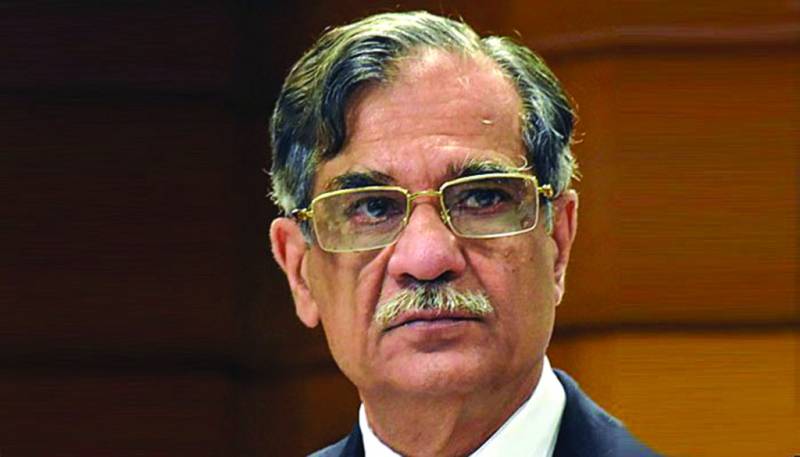
Lately, former chief justice of Pakistan Saqib Nisar has been in the spotlight once again. Talking with an Islamabad-based English daily, the former CJ denied involvement in the controversies raging during his tenure, particularly those involving the investigation team constituted to probe the infamous Panama Leaks against former premier Nawaz Sharif.
The reporter asked him about a story published when he was the CJ under title Tale of the WhatsApp caller and the Panama JIT. According to the story, some unknown caller posing as the registrar of the Supreme Court contacted the State Bank of Pakistan and the Securities and Exchange Commission of Pakistan (SECP) via a WhatsApp message asking them to include some specific names in the panel for the Panama JIT. The caller gave the names of Amer Aziz and Bilal Rasool to the State Bank and SECP respectively, besides naming Irfan Mangi as nominee of NAB on the panel.
Initially, both the SBP and SECP reportedly ignored the mysterious call but later, for unknown reasons, found themselves obliged to include those names in the JIT. For its part, NAB did not raise any objection and readily included Mangi in the JIT panel according to the newspaper report of the time.
Early this week, the intrepid reporter asked the former CJP about the report to which Saqib Nisar said that he had no connection with the setting up of the Panama JIT, and that he never asked the registrar about the WhatsApp call. He claimed that the issue pertained to the implementation bench in the Panama case and not to him. “I do not know why the registrar did it,” the former CJP also told the reporter.
Saqib Nisar may well be right in claiming that he had nothing to do with the reported WhatsApp call by the SC registrar. He may also be right in claiming “I do not know why the registrar did it.” But how does he explain the interference in the domain of the executive in the setting up of the JIT when he was the CJP? The argument often advanced by Saqib Nisar that the courts interfered because the executive failed to perform its duties is dangerously flawed. What will happen if the same argument was also used against the courts?
Moreover, is it enough for Saqib Nisar to brush aside a serious question simply by asserting “I don’t know why the registrar did it”? Was it not necessary to investigate the May 30, 2017 report published in The News? Saqib Nisar, known for taking notice of much lesser transgressions by other state organs, chose to remain silent then. Why?
By opening his mouth at the wrong time for wrong reasons, the former CJP has neither helped himself nor the institution of judiciary. He has only brought into focus once again the harmful legacy that was his and from which the nation will be reeling for a long time.
Just a day after his retirement in January 2019, this scribe penned an article in TFT on the legacy of Saqib Nisar. Now that he has opened his mouth yet again, it would be pertinent to quote from that article.
At the time I wrote that in interpreting the Constitution, Nisar - while strengthening the court - gravely undermined other democratic institutions. The undermining of other democratic institutions is his legacy.
Under his watch the principle of separation of powers was sent into a tailspin. The grave consequences of hyper-activism in response to TV headlines seemed totally lost on him.
He sought to justify raiding schools and hospitals as an important function of the chief justice. He also saw judicial justification in undertaking to build a dam, create a dam fund, collect donations, waive wrong doings in lieu of contributions to it, participate in fundraising dinners in foreign lands with political party workers in toe while brandishing Article 6 against those who saw no judicial wisdom in his pronouncements.
Under him, the principle of independence of judiciary was stretched so as to make judges and judiciary independent even of the law and the Constitution.
As a judge, Nisar often spoke against the unchecked use of suo moto powers and called for setting parameters of their use “to correct the mistakes made.” As chief justice, instead of limiting, he stretched the frontiers of suo moto powers far beyond. When Justice Qazi Faez Isa, sitting on a bench, questioned how public interest litigation could be initiated by a mere nod from the CJ, he abruptly dissolved the bench and removed Justice Isa from it.
Modesty, humility and an absence of arrogance unfortunately were not the defining characteristics of Court Room No 1 then. Remarks like “who is Hamza Shahbaz? I don’t know anyone by this name” and the treatment of eminent journalist Hussain Naqi in full courtroom bear witness to it.
More than a judge, Nisar saw himself as a village elder, Baba Rehmat, an embodiment of wisdom and justice, who must be obeyed and respected by everyone. His remarks in Quetta while referring to the two nations, “One was Muslims and the other — well, I don’t even want to utter the word” (referring to the Hindus) made many heads hang in shame.
But the worst was when a reference was filed against him in October 2018 while he was still the CJP. Filed by about a hundred citizens from all parts of the country who believed in separation of powers, it never came up for hearing as long as Saqib Nisar was chief justice. And when he retired, it was returned by the Supreme Judicial Council on the grounds that it had become infructuous. An appeal against its decision is pending.
Instead of giving spurious, unconvincing and one-sided explanations to the media, Saqib Nisar should offer himself for accountability by peers in the judiciary. And if he cannot do that, he must keep his mouth shut. In it will lie his dignity, if any is left indeed.
The writer is a former senator

The reporter asked him about a story published when he was the CJ under title Tale of the WhatsApp caller and the Panama JIT. According to the story, some unknown caller posing as the registrar of the Supreme Court contacted the State Bank of Pakistan and the Securities and Exchange Commission of Pakistan (SECP) via a WhatsApp message asking them to include some specific names in the panel for the Panama JIT. The caller gave the names of Amer Aziz and Bilal Rasool to the State Bank and SECP respectively, besides naming Irfan Mangi as nominee of NAB on the panel.
Initially, both the SBP and SECP reportedly ignored the mysterious call but later, for unknown reasons, found themselves obliged to include those names in the JIT. For its part, NAB did not raise any objection and readily included Mangi in the JIT panel according to the newspaper report of the time.
Early this week, the intrepid reporter asked the former CJP about the report to which Saqib Nisar said that he had no connection with the setting up of the Panama JIT, and that he never asked the registrar about the WhatsApp call. He claimed that the issue pertained to the implementation bench in the Panama case and not to him. “I do not know why the registrar did it,” the former CJP also told the reporter.
Saqib Nisar may well be right in claiming that he had nothing to do with the reported WhatsApp call by the SC registrar. He may also be right in claiming “I do not know why the registrar did it.” But how does he explain the interference in the domain of the executive in the setting up of the JIT when he was the CJP? The argument often advanced by Saqib Nisar that the courts interfered because the executive failed to perform its duties is dangerously flawed. What will happen if the same argument was also used against the courts?
Moreover, is it enough for Saqib Nisar to brush aside a serious question simply by asserting “I don’t know why the registrar did it”? Was it not necessary to investigate the May 30, 2017 report published in The News? Saqib Nisar, known for taking notice of much lesser transgressions by other state organs, chose to remain silent then. Why?
By opening his mouth at the wrong time for wrong reasons, the former CJP has neither helped himself nor the institution of judiciary. He has only brought into focus once again the harmful legacy that was his and from which the nation will be reeling for a long time.
By opening his mouth at the wrong time for wrong reasons, the former CJP has neither helped himself nor the institution
Just a day after his retirement in January 2019, this scribe penned an article in TFT on the legacy of Saqib Nisar. Now that he has opened his mouth yet again, it would be pertinent to quote from that article.
At the time I wrote that in interpreting the Constitution, Nisar - while strengthening the court - gravely undermined other democratic institutions. The undermining of other democratic institutions is his legacy.
Under his watch the principle of separation of powers was sent into a tailspin. The grave consequences of hyper-activism in response to TV headlines seemed totally lost on him.
He sought to justify raiding schools and hospitals as an important function of the chief justice. He also saw judicial justification in undertaking to build a dam, create a dam fund, collect donations, waive wrong doings in lieu of contributions to it, participate in fundraising dinners in foreign lands with political party workers in toe while brandishing Article 6 against those who saw no judicial wisdom in his pronouncements.
Under him, the principle of independence of judiciary was stretched so as to make judges and judiciary independent even of the law and the Constitution.
As a judge, Nisar often spoke against the unchecked use of suo moto powers and called for setting parameters of their use “to correct the mistakes made.” As chief justice, instead of limiting, he stretched the frontiers of suo moto powers far beyond. When Justice Qazi Faez Isa, sitting on a bench, questioned how public interest litigation could be initiated by a mere nod from the CJ, he abruptly dissolved the bench and removed Justice Isa from it.
Modesty, humility and an absence of arrogance unfortunately were not the defining characteristics of Court Room No 1 then. Remarks like “who is Hamza Shahbaz? I don’t know anyone by this name” and the treatment of eminent journalist Hussain Naqi in full courtroom bear witness to it.
More than a judge, Nisar saw himself as a village elder, Baba Rehmat, an embodiment of wisdom and justice, who must be obeyed and respected by everyone. His remarks in Quetta while referring to the two nations, “One was Muslims and the other — well, I don’t even want to utter the word” (referring to the Hindus) made many heads hang in shame.
But the worst was when a reference was filed against him in October 2018 while he was still the CJP. Filed by about a hundred citizens from all parts of the country who believed in separation of powers, it never came up for hearing as long as Saqib Nisar was chief justice. And when he retired, it was returned by the Supreme Judicial Council on the grounds that it had become infructuous. An appeal against its decision is pending.
Instead of giving spurious, unconvincing and one-sided explanations to the media, Saqib Nisar should offer himself for accountability by peers in the judiciary. And if he cannot do that, he must keep his mouth shut. In it will lie his dignity, if any is left indeed.
The writer is a former senator


